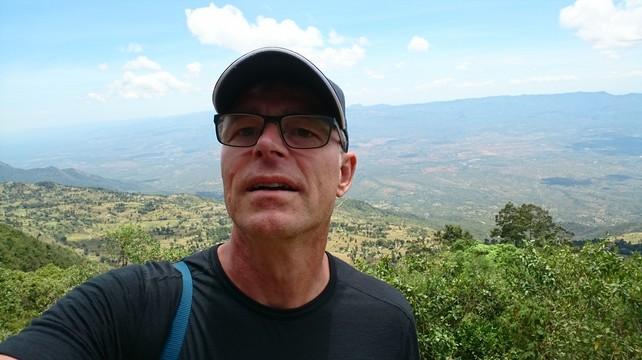My trip to Kenya in September-October 2018 was intended to test import procedures, distribution, mobile payment systems and the partnerships we have built up.
It was a trip with many challenges – which luckily was finally solved – but which, on the way, gave a lot of headaches. Here is a selection of my diary from the trip:
Day 3.
Today we must try to get the M-Pesa payment system registered on our new server. It’s a bit of a cumbersome process where you need to use an old version of MS Internet Explorer, where you need to install a personal certificate. Then you must register as a M-Pesa user – see this guide from iHUB:
(https://ihub.co.ke/blogs/32058/communitystories-guide-to-integrating-to-the-new-mpesa-api)
A little cumbersome and I did not succeed because my email server in Denmark did not respond. On the whole, there was much that would not really succeed. Before the mail server stopped working, I was notified that our goods are not coming to Nairobi before Monday next week, so we will be delayed further. And the certificate that Intertek has to make for shipping to Tanzania is full of errors on both addresses, HS numbers, etc. It does not seem like they are in control of it, compared to SGS, which I usually use, but that do not operate in Tanzania. On the other hand, our shipper Arusha Freight is good and catches the mistakes that have arisen.
I decide to go down the valley – a trip of approx. 4 hours – to rethink and consider whether I have to go back to Denmark and wait for things to fall into place. It will be difficult to reach the villages of Tanzania …
On my way down, I get a call from our software developer Mads in Denmark, telling me that now the server is responding again. It helps my mood and after a reasonably strenuous trip, I finally are at the SEGO Safari Lodge where I check up on the server at home and can not see that there has been anything wrong except that there has been no connection, so it must be the internet connection that has been down – I have not experienced this before.
Day 4
Today, I have agreed with our local partner Deborah that we try to contact one of the families from last year for the test to hear if they will test a battery until the right ones come from Nairobi.
Before we go out to the families, Deborah and I check up on M-pesa and it turns out that we have now been registered and have the necessary information to move on in the process of moving the API over to another server. Good start of the day! Although everything we tried yesterday was wasted and obviously not necessary anyway …
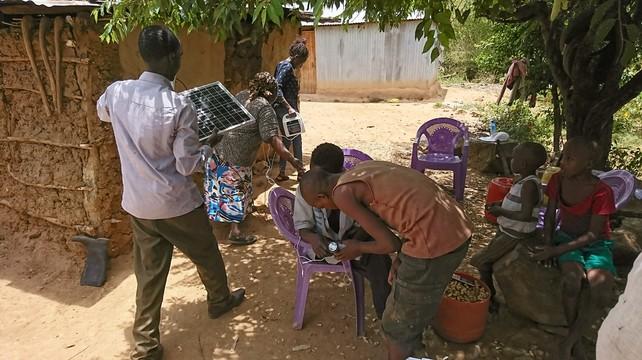
Deborah has found a local young man, Sam, who is an interpreter and may also be a potential agent. We find one of the families and they would like to join again and also want a subscription when we are ready later in the week. We get the solar panel installed and connected to LED bulbs and radio. They are very happy with the facility. I am excited to hear their experiences later in the week.
When I return home at Sego Safari Lodge, I meet the director, Abraham, and show him and the waiter, Maina, about our new product. Deborah has made a folder with prices and services that they also get a copy of. They are very interested and ask them to address Deborah for further agreement. Abraham would like to purchase a facility in cash for use as a backup in another smaller hotel he and his son own in the Sego Center. Also, other guests at Safari Loge are interested in our solution and I would suggest Deborah that we hold a kind of showroom here or in the Sego Center during the week.
All in all, a good day!
Day 6
I go to Muskut school today to greet the teachers and check up on the solar cell installation there.
It’s great to be back and I get a warm welcome. I check up on the solar cells and they seem to be completely flat. We need to buy a new one if we cannot get this done. It costs about $ 150 and is needed for those families who cannot afford a panel to recharge their battery.
For lunch, I sit in the breakfast room with the teachers and when there is a power outage I put our battery to operate the TV (12V 36Watt) and satellite receiver. It’s a good advertisement…
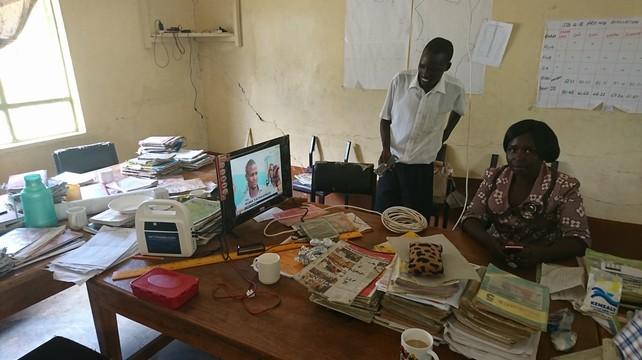
In the afternoon after returning home to Sego I try again to get through to M-pesa, but this is the same problem and there is no help from M-pesa support. In return, Mads has made graphs of consumption and payments as he is making a dashboard.
There is now final confirmation of the batteries come in the evening and Shipper Andrew, thinks that he can have them through customs at noon on Thursday, so we can get out to the families on the weekend before I go on to Tanzania Monday!
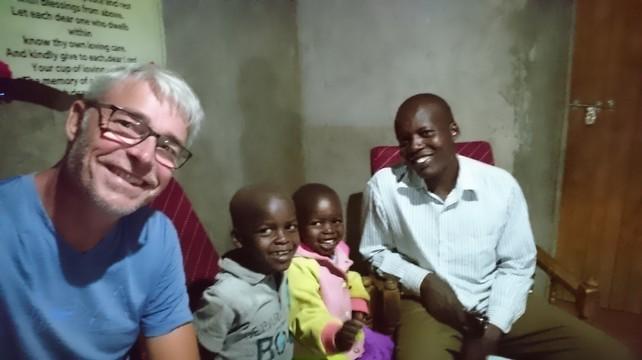
In the evening, Vice School Inspector Wilfred comes by and we go to his house to see his new M-Kopa equipment. It is a nice little LED TV of 12V – 12Watt, but it cannot be supplied by our battery due to different connectors. We also compare the LED bulbs and ours are somewhat more powerful and with better light. M-Kopa is 1.2W and ours is at 5W and can be obtained even larger if desired as it is standard products that can be bought in the stores. It is a big difference to both M-Kopa and d-Light.
It is nice to greet Wilfred’s family and I also get to talk to the children a little. We go home again in total darkness as it is again power outage, but fortunately, we have both the flashlight and the battery and an LED light bulb on the trip …
Day 9
I need to get up early today to drive 1.5 hours into the valley on a motorcycle and meet Deborah so we can get to Eldoret. The manager Maina has ordered a “driver” with experience, as it is a long journey of 35 km by dusty gravel road with many hairpins turns. Price 800Ksh (8USD) and he will also be able to transport 5 sets of batteries …
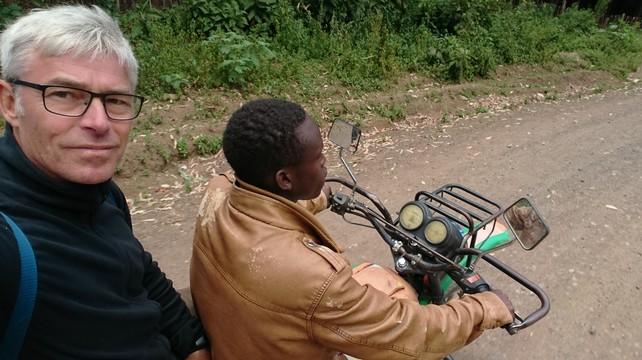
He arrives only 15 minutes late (African time on time, maybe even too early …) and we leave. He asks when I will be back again and I tell him I will stay up there and drive down again by car the next day. We get filled up with a few cola bottles of petrol at a small kiosk near Sego and come to Muskut after 5 km, after which he turns around and drives back towards Sego all in while have been talking lively in the mobile phone. He says he forgot something. Just before Sego we meet a boy about 15 years (I think) who gets the driver’s jacket and keys. He says he should plant tomatoes and that his little brother will drive me up. So much for the “driver” with experience …
But it goes well and he runs very carefully, which is also good with all the bumps on the road. About 5 km from the top, we pick up an extra passenger and drive all three further – approx. 500 meters and then the motorcycle stops – no more gasoline. The third person is picked up by another motorcycle and we are told that we can just roll two kilometers down and get a few liters of gasoline at a kiosk selling them in cola bottles.
Down and up again and after just over half an hour we are up. What to say?
I meet Deborah at the top and we head towards Eldoret. She says that the batteries have been physically inspected at the customs and that we cannot import the goods together (panel, battery, bulbs, and flashlight), but that they must be declared separately. Why (the f ….) did we know it was ok last time – and why is it today after I paid the customs declaration yesterday that the goods are stopped? Andrew our shipper is also frustrated and thinks that the customs employee is looking for bribes, but that we have to insist on not paying more.
We first get a new inventory of 590 USD, but later it is made up to 420 USD, as we refuse to pay the high tariff. A price that was probably made to make us pay the bribe instead. Andrew gets a new customs declaration prepared and the money goes directly to the Customer Revenue’s bank account, so we are sure there will not be paid bribes.
Deborah and I get a talk about getting some written material about our company and what we do – and then collecting customs papers from this and last import to hear the authorities why there is a difference in what we get to know. We need to have a written commitment on what to do. And here the shipper Andrew and the importer Ofgen will help us. I also ask Deborah if she knows any politicians who can help us. Deborah must get it in place before I go here again in November to follow up and make another test drive – and to get out into the villages in Tanzania, which I do not reach this time. (I later prepared written material about the product and sent it to Deborah).
It is difficult to keep up the good mood, but we must focus on the fact that the most important thing this time is to show that we have customers and that they can and will pay for our solution. Validation of costs for production, freight, distribution, and sales come next – when we have 1000 batteries ready.
We therefore also get a talk about that Deborah will make a plan for how we store, distribute and sell our solution all the way from Nairobi / Mombasa and out to the various districts and beyond to the villages. Method and cost.
We must have bought the solar cell battery and raised the money for the duty and Deborah must also have bought something for his mother. She parks in the second row and slips into a shop while she asks me to be ready to move the car if someone needs to get out. She’s not gone for more than 5 minutes, but before she gets back, a guy comes and puts a lock on the wheel before I can react. I tell him I’m just waiting for someone and I can just drive a little forward. But white man (Mzungu) – and the opportunity for much money – so it doesn’t work. When Deborah comes back, we can’t move on. She asks me to go and withdraw the money while she tries to get the wheel lock removed.
When I come back she is gone, but the car is still in the middle of the road and blocks the other parked cars, where some now want to go out. There comes a man to me and asks what has happened – he saw the process and it is not normal to print fines for loading and unloading especially when there is a driver in the car. He says that the fine will normally be around approx. 10USD.
When Deborah comes back, she tells me they want 50USD and she could just pay. She told them I was going to the airport and therefore had to leave the place and she could not pay – so after some women’s drunkenness and tears, she was allowed to get out of paying the fine. A beautiful and fair system 😉
When we finally were on our way again we just had to pick up the solar cell battery – it turned out that they had no one in stock, so we drove from Eldoret without getting anything out of the day … besides a number of exciting experiences.
Nor did I reach the airport and therefore do not come to Nairobi, but the driver has come down to Andrew and is waiting for the goods to come out of the duty now that we have paid the extra duty.
I have been dropped off at a Java Coffee House, while Deborah goes home to pick up her sister who is also going to the airport this evening to return to Ireland and Facebook again.
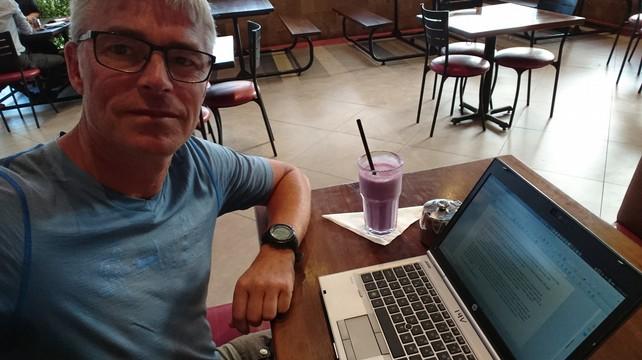
Here I am sitting and writing my diary as well as emails for SolarKiosk and Rafiki Power in Tanzania to tell them that we will have to postpone the visits in the villages due to delayed batteries until I return again in November, but that I really want to meet with next week about planning. Next week in Tanzania will be used to get the goods out of the customs there and have our local company established so that we can get the payment channels up and running.
Regarding payment channels, I also write a mail to M-pesa here in Kenya and ask them to remove our validation of the payments and only send us a confirmation that the payment has gone through. In this way, we cannot reject payments, but we can add them to our database and thus control our batteries. The second best solution and then we have to get validation up and running. Now I just hope that M-pesa can react a bit quickly so we can get started getting customers into the store tomorrow …
It is, in fact, a good milkshake!
There is a really good G4 connection here at JAVA House, so I also get called home and talked a long time with Annie – and it helps to unload my concerns. It was great to talk to her again over a good connection.
I am picked up around 10 am by Deborah and she says that the batteries have not come out of customs before they closed – Fxxx (excuse my French) this day!
Day 11
Deborah drives me down the valley, where we will visit the test family that has one of the batteries to hear about the last days experience. Fortunately, it has gone really well and they are ready when we can deliver the payment solution.
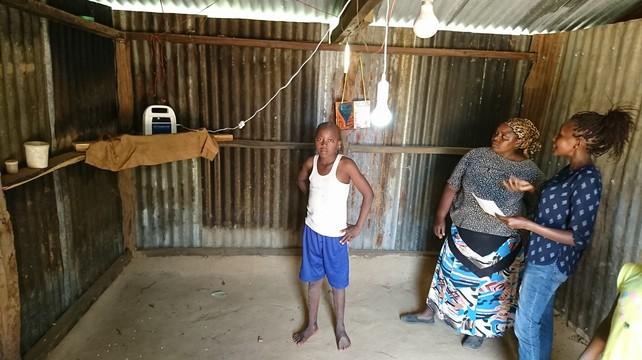
They only use approx. 25% of battery capacity daily and can make up for the daily leasing payment of 30 or 40 ksh by charging neighbors’ mobile phones. The tariff for this is usually 10 Ksh, and since they can charge 4 at a time it can actually be a good business…
We continue to Sego Lodge to have lunch and pack my cases so we can drive to Eldoret airport where I will be flying later in the evening.
I am put off there where I also wrote a diary Thursday and get followed up on the diary again today.
Arriving approx 10 pm to the Holiday Garden Inn in Nairobi and get me a much-needed bath and a chat with Annie at home.
Day 13
I’m going to the customs today to get our batteries released and I’m waiting for driver Michael to come and pick me up. While I wait, Christina from Prime Cargo writes that the shipment to Tanzania is another week late and now only comes next Sunday … after I go home.
It all goes incredibly slowly this time …
We are at Andrews 11 am and I have two hours before going on a bus to Arusha in Tanzania. Andrew says that there are only formalities left and that KEBS has dropped the extra 15%. That is really good! We get a talk about the possibilities of importing via China and Mombasa and here Andrew can well participate and give Deborah an offer to get a 40 feet container out of the port and transport it to eg. Eldoret. We will have about 20 days to empty it and get it back.
The batteries do not get out of duty before I have to move on, so I can’t get to upload software and put sim cards in them. That means we can’t distribute them to the families until I’m back.
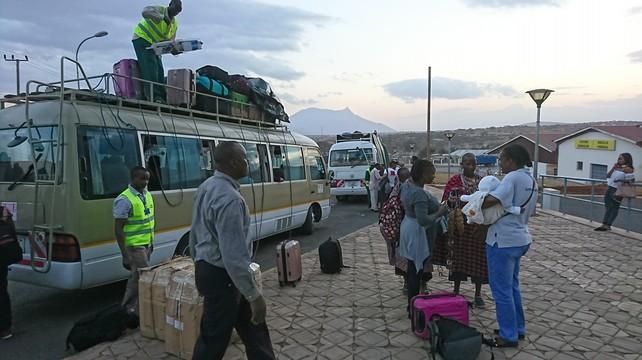
While driving with the Riverside bus towards Arusha, Deborah writes that now the batteries are out of customs and heading towards Eldoret.
I am picked up by my driver Arnold in Arusha and will be driven to the Flamingo hotel after refueling my Vodacom subscription.
And then I go to bed at 10 pm – again a little tired of it all …
Day 14
I wake up early in the morning because Annie sends an SMS – she is up early today. We get a good long talk and it helps both her and my mood. I’m ready for today’s challenges!
After breakfast, I start to make a new detailed budget for the combination of both DK and Africa companies. We must use this to validate our business model, which is now taking shape with both productions, transport, export / import, customs clearance, storage, distribution, sales, and service.
With all the new inputs, it is still a really good business we are doing and we just have to overcome the obstacles that arise!
I have arranged meetings with Vitto, the former bookkeeper from Rafiki Power at. 14 and with Kisuejo and Ian who will be co-owners of our local branch and lawyer Mutabazi at. 17. Then Kisuejo and I will meet with Arnold and a friend of his called Linus, who works as sales manager for a solar company.
Vitto has made the study of how the families have used and taken our battery solution. We agree that he should finish it and go out to the village one last time and also take some pictures. The questions are who used the battery (description of the family) and what did they use the battery for and how often did they charge it? What opportunities for improvement do they see and how can the battery help to give them an income? How do they see the possibility of paying the 700 Tsh daily + 1500 TSh for a charge – approx. 6500 weekly? Do they have the option of mobile payment?
We also agree that Vitto must try to outline a model for distribution incl. cost of our solution involving local agents.
The two reports must be completed until I come down here next time and we agree on a payment for the work of 200,000 Tsh approx. 80 USD.
The meeting with the lawyer provides an update on why the company has not yet been registered. This is due to the fact that all citizens of Tanzania currently is in the process of getting new ID cards and this new ID card is to be used when registering the company. Once Ian and Kisuejo have received their card, the company can be registered within 10 days. After that, the auditor Robert must obtain VAT and TIN number and with them, we can get started with getting a bank account and mobile payment accounts. This work is done by Robert. Before that, Ian, Kisuejo and I will have created a founding general meeting where remuneration, etc. is determined. The lawyer can do this for our signature. Robert will investigate the circumstances surrounding the VAT exemption on solar cell equipment. (there is the shipper Kilasara also noted)
The last meeting with Arnold’s friend Linus gave a good insight into how to find customers via agents who get agreements – after which Linus and other managers / technicians set up the units. They have an app for registering customers and customer relationships. Customers pay over mobile pay. If they do not have an account themselves, they can pay in cash via one of the many shops where payment is made on mobile payment accounts. They can then transfer the amount to Mobisol and the customer account that the customer has.
They make events in the villages where they drive out and show the product and get agreements in place. Linus has made marketing materials, leaflets, radio spots, T-shirts, etc. and he is also responsible for some of the bookkeeping and accounts. It turns out that he might want to work for us and we must decide when we get closer. He seems like a solid guy. He also explains the fact we have observed that other companies equipment has a reputation for not functioning anymore when they take over the plant. He explains that this is because they have to buy a new battery (it is an ordinary lead battery where equipment can be connected outside the charger) as it has often been overloaded because they have connected too much equipment to it. This is something we must be aware of.
Finished for today – tomorrow it will be Rafiki Power and a drive out to Kisuejo’s town of Marangu at the foot of Kilimanjaro.
A good day and things have progressed a bit …
Day 16
Today we have to drive around and find customers in the Marangu area. We visit families, schools, and hospitals. The market is large – also for cash payers who want a backup system. Also, the tourist agencies are very interested in our solution for use on trekking and safaris.
I agree with Kisuejo that he makes a small report of the day. It’s here:
“It was a pleasure to walk together around the village and talk with villagers about our products, also I am glad that we visit some of the tourism company in Moshi known as Top Climbers, they accept our products and I hope we can do business with them.
We also visit Marangu hospital, we meet doctors and were interested too in have our products.
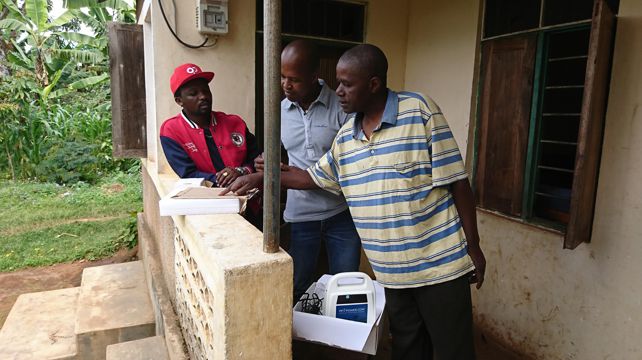
Around village people were interested in our products too although they had some questions on the payments, some ask if is possible to pay in advance before they take a battery, some ask if is we can reduce the price and other questions were if possible to have a camera chargers and mac-book charger.
They ask also if they can pay big amount of money in advance like paying 300,000 and later 150,000 until they finished.
As the company we need to figure out how we can negotiate with our customers so that they can be satisfy.
All in all the trip was good and we can create a good market for the future.”
We do not have time to visit Kilimanjaro Gaten to talk to them about using our battery in their huts on the mountain, but Kisuejo and his father will follow up on this next week. His father is a good friend of the administrator there.
Before going back to Arusha and I have to go to Dar, we have time to go for a walk down the valley, where there is a waterfall – it is a nice trip and here I must definitely go back with my family.

I arrive at Dar Es Salaam and my hotel (Transit Airport Motel) at 23 pm and I’m tired. The motel is located next to the airport in a less affluent (read poor) neighborhood.
The last day!
I have two meetings today. First one with Attu, she is Customer Service Director for PowerGen (Have bought Rafiki Power). They are a US company and are the largest micro-grid company in Africa. It’s a super meeting with Attu. In PowerGen, they have discussed our solution at the highest level after they were made aware of our solution through Rafiki Power. Our solution can enable them to guarantee some coverage when bidding on public projects for electrification. Their concern is the quality of our solution (they do not know it) so it is perfect to run a test in one of their villages until November with a couple of our batteries.
The next meeting is with Marc from SolarKiosk. Before that, I just got to have lunch at the delicious Italian inspired “Meditarienien Restaurant” which is right on the water – a lovely place I have visited every time I am in Dar.
Marc has and has been busy and is also meeting with Ketan (it was him and Thomas I held the first introductory meeting with). We talk about their experiences that Anastasia has written about. Their concern is that people start using the battery to charge mobile phones. They can clearly see that the payment for this in the kiosk has gone down since the kiosk owner has begun to use the battery. She does this for free this time and therefore she gets the whole profit herself – it will not happen when they start paying for charging the battery. This leads us to a review of the model we intend to offer to both customers and kiosk owners regarding the use of the battery.
Marc is pleased with our joint project and is looking forward to the payments also going to work. He will subsequently send me Anastasia’s report.
I am really happy with the last couple of days down here and although much has gone wrong, there is also a lot that has led us forward in our process of getting a healthy business up and running.
So I am confident and still convinced that we have got something exciting and big!

